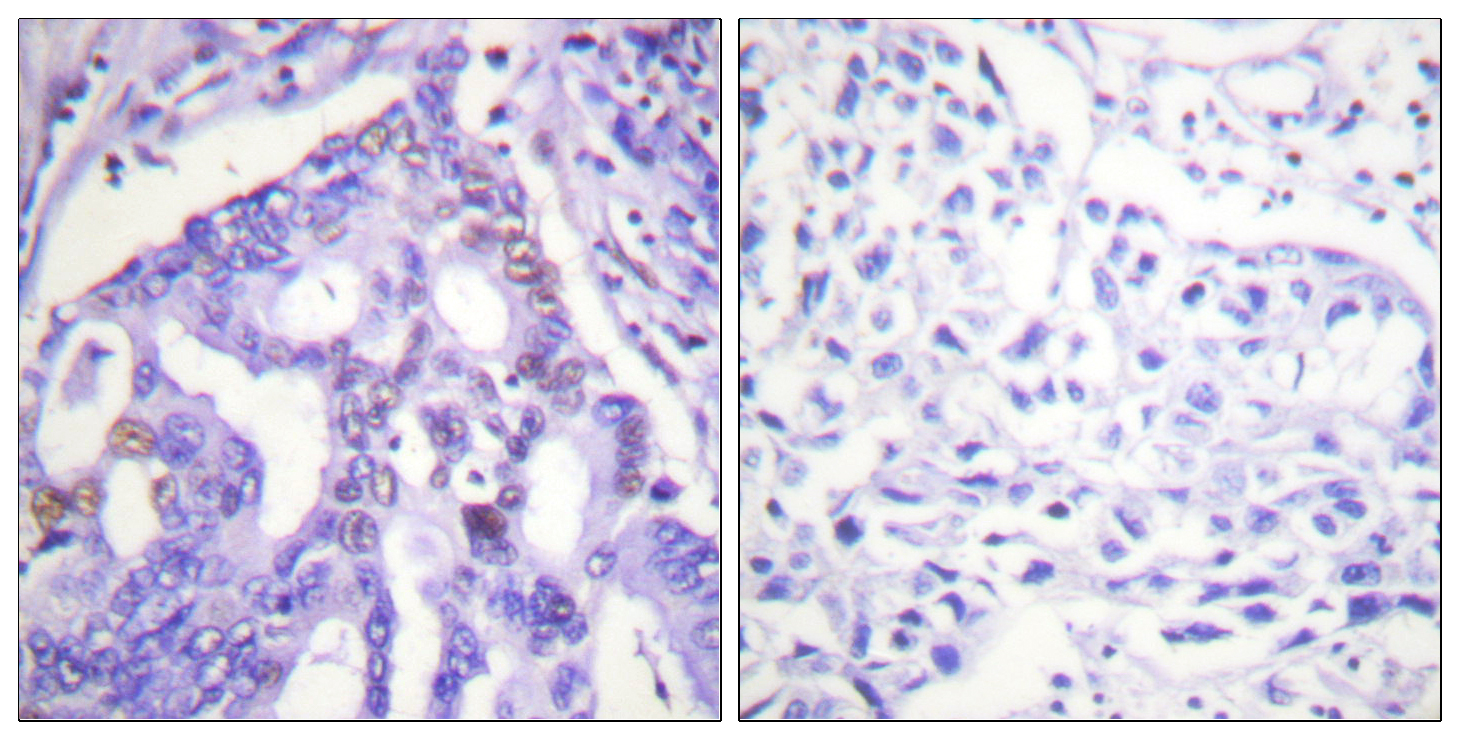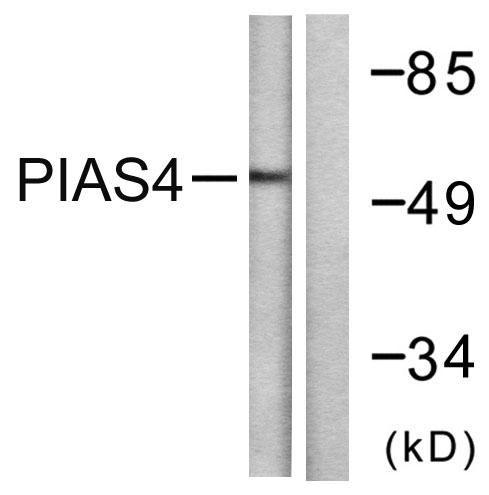PIASy Polyclonal Antibody
- Catalog No.:YT3720
- Applications:WB;IHC;IF;ELISA
- Reactivity:Human;Mouse
- Target:
- PIASy
- Fields:
- >>NF-kappa B signaling pathway;>>Ubiquitin mediated proteolysis;>>JAK-STAT signaling pathway;>>Fluid shear stress and atherosclerosis
- Gene Name:
- PIAS4
- Protein Name:
- E3 SUMO-protein ligase PIAS4
- Human Gene Id:
- 51588
- Human Swiss Prot No:
- Q8N2W9
- Mouse Gene Id:
- 59004
- Mouse Swiss Prot No:
- Q9JM05
- Immunogen:
- The antiserum was produced against synthesized peptide derived from human PIAS4. AA range:451-500
- Specificity:
- PIASy Polyclonal Antibody detects endogenous levels of PIASy protein.
- Formulation:
- Liquid in PBS containing 50% glycerol, 0.5% BSA and 0.02% sodium azide.
- Source:
- Polyclonal, Rabbit,IgG
- Dilution:
- WB 1:500 - 1:2000. IHC 1:100 - 1:300. ELISA: 1:20000.. IF 1:50-200
- Purification:
- The antibody was affinity-purified from rabbit antiserum by affinity-chromatography using epitope-specific immunogen.
- Concentration:
- 1 mg/ml
- Storage Stability:
- -15°C to -25°C/1 year(Do not lower than -25°C)
- Other Name:
- PIAS4;PIASG;E3 SUMO-protein ligase PIAS4;PIASy;Protein inhibitor of activated STAT protein 4;Protein inhibitor of activated STAT protein gamma;PIAS-gamma
- Observed Band(KD):
- 56kD
- Background:
- domain:The LXXLL motif is a coregulator signature that is essential for transcriptional corepression.,function:Functions as an E3-type small ubiquitin-like modifier (SUMO) ligase, stabilizing the interaction between UBE2I and the substrate, and as a SUMO-tethering factor. Plays a crucial role as a transcriptional coregulation in various cellular pathways, including the STAT pathway, the p53 pathway, the Wnt pathway and the steroid hormone signaling pathway. Involved in gene silencing. Promotes PARK7 sumoylation. In Wnt signaling, represses LEF1 and enhances TCF4 transcriptional activities through promoting their sumoylations.,pathway:Protein modification; protein sumoylation.,PTM:Sumoylated. Lys-35 is the main site of sumoylation. Sumoylation is required for TCF4 sumoylation and transcriptional activitation. Represses LEF1 transcriptional activity. SUMO1 is the preferred conjugate.,similarity:Belongs to the PIAS family.,similarity:Contains 1 SAP domain.,similarity:Contains 1 SP-RING-type zinc finger.,subcellular location:Colocalizes with SUMO1 and TCF7L2/TCF4 and LEF1 in a subset of PML (promyelocytic leukemia) nuclear bodies.,subunit:Interacts with AR, GATA2, LEF1, TP53 and STAT1 (IFNG-induced). Binds to AT-rich DNA sequences, known as matrix or scaffold attachment regions (MARs/SARs) (By similarity). Interacts with TICAM1. Interacts with KLF8; the interaction results in SUMO ligation and repression of KLF8 transcriptional activity and of its cell cycle progression into G(1) phase.,tissue specificity:Highly expressed in testis and, at lower levels, in spleen, prostate, ovary, colon and peripheral blood leukocytes.,
- Function:
- domain:The LXXLL motif is a coregulator signature that is essential for transcriptional corepression.,function:Functions as an E3-type small ubiquitin-like modifier (SUMO) ligase, stabilizing the interaction between UBE2I and the substrate, and as a SUMO-tethering factor. Plays a crucial role as a transcriptional coregulation in various cellular pathways, including the STAT pathway, the p53 pathway, the Wnt pathway and the steroid hormone signaling pathway. Involved in gene silencing. Promotes PARK7 sumoylation. In Wnt signaling, represses LEF1 and enhances TCF4 transcriptional activities through promoting their sumoylations.,pathway:Protein modification; protein sumoylation.,PTM:Sumoylated. Lys-35 is the main site of sumoylation. Sumoylation is required for TCF4 sumoylation and transcriptional activitation. Represses LEF1 transcriptional activity. SUMO1 is the preferred conjugate.,simil
- Subcellular Location:
- Nucleus, PML body . Colocalizes with SUMO1 and TCF7L2/TCF4 and LEF1 in a subset of PML (promyelocytic leukemia) nuclear bodies. .
- Expression:
- Highly expressed in testis and, at lower levels, in spleen, prostate, ovary, colon and peripheral blood leukocytes.
- June 19-2018
- WESTERN IMMUNOBLOTTING PROTOCOL
- June 19-2018
- IMMUNOHISTOCHEMISTRY-PARAFFIN PROTOCOL
- June 19-2018
- IMMUNOFLUORESCENCE PROTOCOL
- September 08-2020
- FLOW-CYTOMEYRT-PROTOCOL
- May 20-2022
- Cell-Based ELISA│解您多样本WB检测之困扰
- July 13-2018
- CELL-BASED-ELISA-PROTOCOL-FOR-ACETYL-PROTEIN
- July 13-2018
- CELL-BASED-ELISA-PROTOCOL-FOR-PHOSPHO-PROTEIN
- July 13-2018
- Antibody-FAQs
- Products Images

- Immunohistochemistry analysis of paraffin-embedded human lung carcinoma tissue, using PIAS4 Antibody. The picture on the right is blocked with the synthesized peptide.

- Western blot analysis of lysates from Jurkat cells, using PIAS4 Antibody. The lane on the right is blocked with the synthesized peptide.



